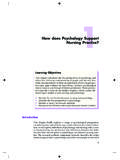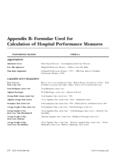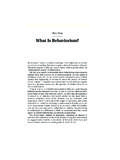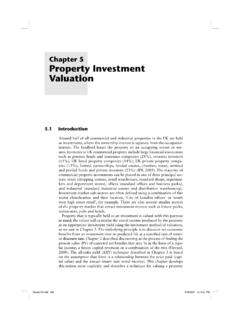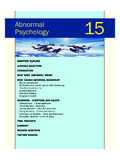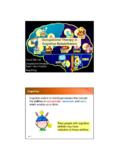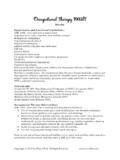Transcription of Part 1 Cognition and the Occupational Therapy …
1 Part 1 Cognition and the Occupational Therapy ProcessPart 1 delineates and describes the practice of Occupational Therapy in relation to the needs of people with cognitive impairments. It consists of three 1 establishes that Cognition is a fundamental compo-nent of all purposeful activity and presents an Occupational ration-ale for addressing cognitive problems. The reader is introduced to two theoretical frameworks. One describes the domain of occupa-tional Therapy and its components and processes. The other is an international framework that defi nes and articulates components of health and well-being.
2 Together they are used to conceptualise and structure the role and functions of Occupational Therapy in cognitive 2 proceeds to discuss the purpose and practice of assessment in cognitive rehabilitation. Frameworks are reviewed in terms of their value for assessment, and good assessment prac-tices and procedures are described. Key factors are considered which contribute to sound clinical reasoning and decision making, in order to achieve appropriate 3 presents a comprehensive overview of the interven-tion process and considers issues of evaluating the outcomes of intervention.
3 Rehabilitation interventions are considered in terms of context and suitability of approaches. A range of common methods and techniques are briefl y described, along with consid-erations of how to grade Part 1, the intention is to present general guidelines, considerations and recommendations for practice. Neither a pre-scriptive set of assessment and intervention solutions to specifi c cognitive problems, nor ready-made recipes for practice will be presented. Every therapist must utilise their own knowledge, rea-soning and professional skills to provide the best possible occu-pational Therapy for each of their clients.
4 Part 1 aims to provide support to that general guidelines for assessment and intervention given in Chapters 2 and 3 should be considered in conjunction with the more detailed suggestions given at the end of Chapters 5 Occupation and cognitive RehabilitationThe scope of cognitive rehabilitationOccupation is described as being purposeful or meaningful activities in which humans engage as part of their normal daily lives .. all aspects of living that contribute to health and fulfi l-ment for an individual (McColl et al.)
5 , 2003, p. 1). It has been more broadly defi ned as everything people do to occupy them-selves including looking after themselves and contributing to the social and economic fabric of their communities (Law et al., 1997, p. 32).That any health problem can have implications for all aspects of life, and not just the physical and mental state of the indi-vidual, is becoming an accepted view. It is endorsed and embod-ied within the World Health Organisation s defi nition of health as a state of complete physical, mental and social well-being and not merely the absence of disease or infi rmity (World Health Organisation, 1946).
6 By accepting the defi nitions of occupation given above, it can be appreciated that the Occupational com-ponents of an individual s life become central to health and individuals with neurological damage, cognitive defi cits are often the source of functional problems but they are unseen or dif-fi cult to manage. Poor task performance, in the absence of motor defi cits, may originate in poor object recognition or sequencing (see Figure ). The person who cannot recognise his or her family may be mistakenly labelled with memory loss.
7 The person who does not respond to questions may have an attention problem which is often confused with deafness. Also, there are several possible reasons which account for a person who lives alone being unable to organise a daily of brain structure or function, inherited or acquired, may give rise to diffi culties in the ways that people think, feel and/or act. These diffi culties can result in loss of, or diffi cul-ties in acquiring or maintaining, abilities and skills.
8 This results in changes in the social, economic and home circumstances of 4 Cognition and the Occupational Therapy Processthe individual and his family. Within the context of occupation, cognitive defi cits are likely to impact on some, if not all aspects of life, and Occupational Therapy forms a signifi cant component of therapists engage with people as patients, clients, students, workers and family members, in a range of environ-ments such as hospitals, day centres, schools, the workplace and the home.
9 Hence, Occupational assessment becomes paramount to investigate the full impact of cognitive defi cits upon the life of the affected individual, and also upon the people he/she relates and interacts scope of cognitive rehabilitation arguably embraces virtu-ally all aspects of life. Assessment is only one part of a process that seeks to enable an individual to function optimally within his or her usual environment(s), to maintain health and well-being, and engage in valued occupations (Crepeau et al.)
10 , 2003). The causes (for example traumatic brain injury, cerebrovascular disease, infection) and nature of cognitive defi cits may require intermittent or long-term engagement with rehabilitation and/or support services, at any point in Cogni-tive defi cits result in problems with task and cognitive Rehabilitation 5 Cognition , occupation and the International Classifi cation of Functioning, Disability and HealthEffective therapeutic intervention requires a means of gathering and organising information (a framework).




